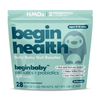Preventing Allergies in Babies: The Role of Gut Health in Early Life
Understanding How a Healthy Gut Microbiome Can Reduce Allergy Risks and Steps to Support It
share this article

The incidence of allergies in our little ones has been on the rise over the past few decades, with nearly 8% of kids in the United States now affected by food allergies alone. Studies suggest that gut health in early life plays a crucial role in the development of these allergies. Understanding how the infant gut microbiome influences the immune system and taking steps to support its healthy development can help reduce the risk of allergies in babies.
The Gut Microbiome and Immune System Development
The gut microbiome, composed of trillions of microorganisms, including bacteria, fungi, and viruses, begins to develop at birth and continues to evolve during the first few years of life. This microbiome is essential for the development of the immune system. A diverse and balanced gut microbiome helps train the immune system to distinguish between harmful and harmless substances, reducing the likelihood of allergic reactions.
Research indicates that infants with a less diverse gut microbiome are more likely to develop allergies. A study published in Nature Medicine found that infants who developed allergies by age two had significantly lower levels of beneficial bacteria like Bifidobacterium and Lactobacillus in their gut during the first six months of life. Another study found that kids who developed asthma had distinct microbial imbalances in their gut as early as one month old, suggesting that early gut health is closely linked to allergy and asthma risk.
Factors Affecting Gut Health in Infants
Several factors can influence the development of a baby’s gut microbiome and, consequently, their risk of developing allergies:
-
Mode of Delivery: Babies born via C-section are less exposed to the mother’s vaginal microbiota, leading to differences in their gut microbiome compared to vaginally delivered babies. Studies show that C-section babies are more likely to develop allergies, asthma, and eczema.
-
Breastfeeding: Breast milk contains prebiotics like human milk oligosaccharides (HMOs) that promote the growth of beneficial bacteria, as well as antibodies that help develop the infant’s immune system. Breastfed infants generally have a more diverse gut microbiome and are at a lower risk of developing allergies compared to formula-fed infants.
-
Antibiotic Use: Antibiotics can disrupt the balance of the gut microbiome by killing beneficial bacteria along with harmful ones. Early antibiotic use has been linked to an increased risk of developing allergies and asthma in childhood.
Preventing Allergies by Supporting Gut Health
Parents can take several steps to support their baby’s gut health and potentially reduce the risk of developing allergies:
-
Breastfeeding: Aim to exclusively breastfeed for at least the first six months. If breastfeeding isn’t possible, consider using a supplement such as Beginbaby Prebiotics + Probiotics which contains added prebiotics and probiotics (through 2'FL-HMO and Bifidobacteria) to support gut health.
-
Limit Antibiotic Use: Use antibiotics only when necessary and prescribed by a healthcare provider. If your baby needs antibiotics, talk to your doctor about ways to support gut health during and after treatment.
-
Diverse Diet: When introducing solids, include a wide variety of fruits, vegetables, and whole grains to encourage microbial diversity in the gut. Introduce potential allergens gradually and consult with your pediatrician about the best approach for your baby.
Conclusion
The health of a baby’s gut microbiome is intricately linked to their risk of developing allergies. By supporting gut health through breastfeeding, introducing prebiotics with probiotics, limited antibiotic use, and the introduction of a diverse diet, parents can help minimize the risk of allergies and set the foundation for a healthy immune system.
Summary
Gut health in infancy significantly influences the risk of developing allergies later in life. By focusing on practices like breastfeeding, adding prebiotics with probiotics, and introducing a diverse diet, parents can support their baby’s gut health and reduce the likelihood of allergies.

















